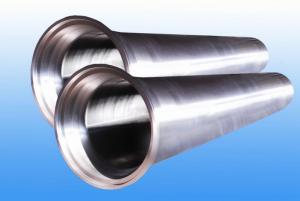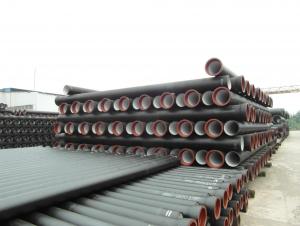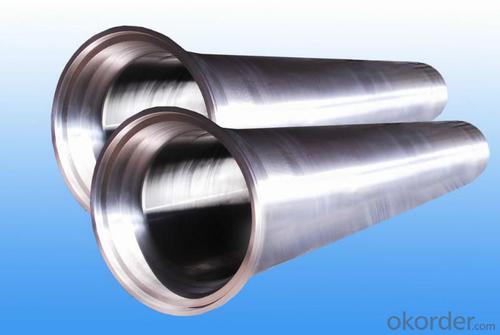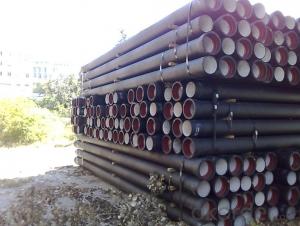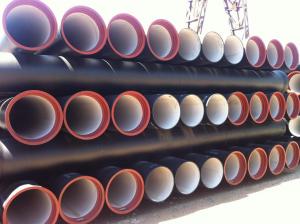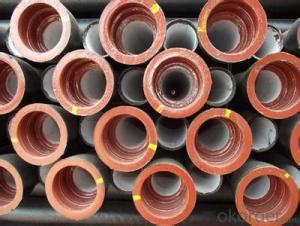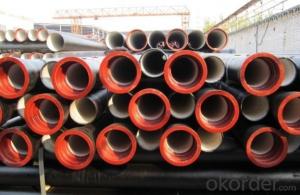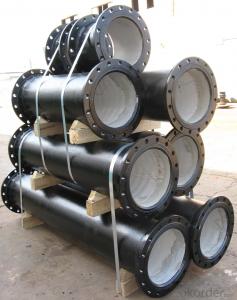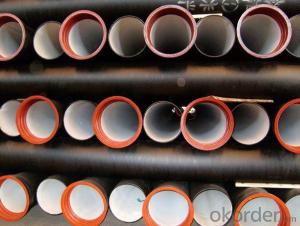Ductile Iron Pipe of China ISO2531 DN500-1DN1000
- Loading Port:
- China main port
- Payment Terms:
- TT or LC
- Min Order Qty:
- 10000 m.t.
- Supply Capability:
- 200000 m.t./month
OKorder Service Pledge
OKorder Financial Service
You Might Also Like
1.Ductile Iron Pipe Description :
1) Pipes confirm to ISO2531,K9 class,T type joint,6m long,with inside cements lining conform to ISO4179, outside Zinc
spraying(130g/m2) and bitumen coating(70μm) conform to ISO8179.
2) Pipe ends: Spigot and socket ends, with 100% SBR rubber gaskets accoding to ISO4633
3) we can do third party inspection according to customer's request.
2.Main Features of the Ductile Iron Pipe:
•High yield strength
•High tensile Strength
•High corrosion resistance
•Pressure Resistence
1. Material: Ductile iron grade 500-7/ 450-10 in accordance with ISO1083
2. Standard: ISO 2531, EN545, EN598, ANSI, AWWA
3. Certificate: ISO9001, ISO14001, SGS, NSF, WRAS
4. Test: In accordance with ISO 2531 / EN 545 / EN598 and 100% water pressure test
5. Length: 6m or cut into 5.6m, 5.7m, 5.8m
6. Internal Lining: Cement, conform to ISO4179
3.Ductile Iron Pipe Images:
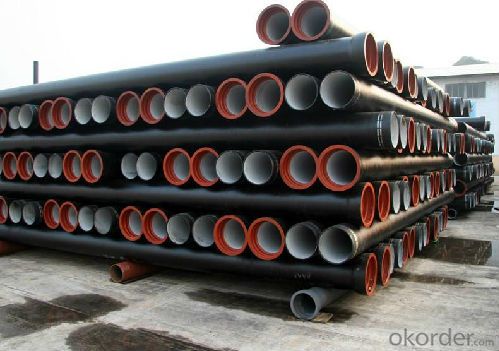
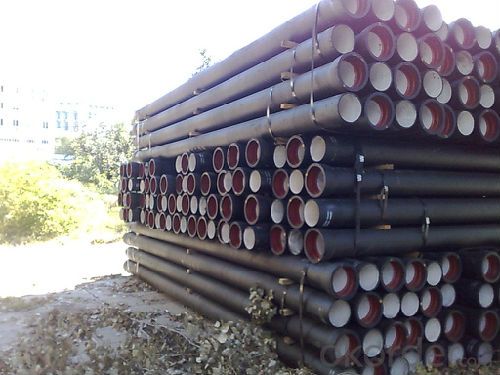
4.Ductile Iron Pipe Specification:
Standard: API SPEC 5L 44th eidtion,ASTM A252-98(2007)
Grade: A53 Grades A/B, ASTM A106 Grades B/C,ASTM A179
AWWA, C200, ASTM A139, ASTM A120, API 5L Grade B
X42, X52, X56, X60, X65, X70, X80, X100
Weld Alternatives: LSAW
OD size range: 6.4~44.5mm
Wall thickness: 406.4~1422mm
Note: Other grade can also be provided after consulting. Special design are available
for coal slurry conveyance LSAW line tube -- Service
5.FAQ:
We have organized several common questions for our clients,may help you sincerely:
1.Q: Why would you choose ductile iron pipe rather than other pipe materials?
A:The reasons are obvious for that not only ductile iron pipe possesses the inherent strength and flexibility of ductile
iron, combined with proven corrosion protection systems, but also the cost savings can be achieved from design to
installation and commissioning.
2.Q:Why can you guarantee the inner of pipes can’t be corroded?
A: High alumina cement mortar lining and sulphate-resistant cement mortar lining. These two special linings are applicable
to inner anti-corrosion for sewage pipes, improving resistance to erosion of the sewage components.
- Q: Can ductile iron pipes be used in high-pressure applications?
- High-pressure applications can indeed utilize ductile iron pipes. These pipes boast impressive strength and durability, which renders them suitable for managing high-pressure fluids or gases. When compared to alternative pipe types like PVC or HDPE, ductile iron pipes possess a higher pressure rating. Moreover, they exhibit excellent resistance to external loads and have the capacity to endure high internal pressures. Water and wastewater systems frequently employ these pipes, alongside industrial settings that encounter high-pressure conditions. Nevertheless, it is crucial to guarantee that ductile iron pipes utilized in high-pressure scenarios adhere to the necessary standards and specifications to assure safe and dependable operation.
- Q: What is the expected thermal expansion coefficient of ductile iron pipes?
- The expected thermal expansion coefficient of ductile iron pipes varies depending on several factors, including the specific composition of the iron and the temperature range in which the pipes are being used. However, as a general guideline, the thermal expansion coefficient of ductile iron pipes typically falls within the range of 10 to 14 x 10^-6 per degree Celsius (10-14 μm/m°C). This means that for every degree Celsius increase in temperature, a ductile iron pipe will expand by approximately 10 to 14 micrometers per meter of length. It is important to note that these values are approximate and may vary depending on the specific conditions and application of the pipes.
- Q: What are the disadvantages of using ductile iron pipe?
- There are several disadvantages associated with using ductile iron pipe. Firstly, one major drawback is its cost. Ductile iron pipe tends to be more expensive than other types of piping materials such as PVC or even traditional cast iron. This can make it less appealing for projects with strict budget constraints. Secondly, ductile iron pipe is relatively heavy compared to other materials. This makes it more difficult to handle and install, requiring specialized equipment and additional labor. The weight can also make it more susceptible to damage during transport and installation. Another disadvantage is its susceptibility to corrosion. While ductile iron is more resistant to corrosion than traditional cast iron, it is still prone to rust and deterioration over time. This can lead to reduced lifespan and potential leaks or pipe failures. Additionally, ductile iron pipe has limited flexibility and is not as resistant to ground movement or settlement. This can result in cracking or breaking of the pipe, especially in areas with unstable soil conditions or seismic activity. Lastly, ductile iron pipe can have a rough interior surface, which can lead to increased friction and reduced flow capacity. This can result in higher pumping costs and decreased efficiency in fluid transportation. Overall, while ductile iron pipe has its advantages, such as its strength and durability, these disadvantages should be carefully considered when choosing the appropriate piping material for a specific project.
- Q: How can the ductile iron pipes be treated with corrosion protection?
- Epoxy coal tar coatingThe epoxy coal tar coating is not only suitable for gas pipelines, but also for sewage pipes. It is a two component coating with a high adhesion and a very smooth surface
- Q: Is there any cast iron pipe used in the fire hose?
- No, I think so. In theory, you can.See if the specifications have any requirements for the material.
- Q: How do ductile iron pipes perform in high-pressure applications?
- Ductile iron pipes are highly renowned for their exceptional strength and durability, making them incredibly suitable for applications with high pressure. These pipes are specifically designed to endure immense internal and external pressures, making them well-suited for both underground and above-ground installations where high-pressure conditions are anticipated. One of the primary advantages of utilizing ductile iron pipes in high-pressure applications lies in their capacity to resist cracking or bursting. The material's inherent ductility enables it to absorb and distribute pressure evenly, significantly reducing the risk of failure under high-pressure circumstances. Consequently, ductile iron pipes are a dependable choice for water supply systems, oil and gas pipelines, and other demanding applications subject to substantial pressure. Moreover, ductile iron pipes exhibit outstanding corrosion resistance properties, further enhancing their performance in high-pressure environments. These pipes are typically coated with a protective layer, such as cement mortar or epoxy, which serves as a barrier against corrosion. By preventing the formation of rust or scale inside the pipe, this protective coating ensures smooth flow and upholds structural integrity even under high-pressure conditions. Furthermore, ductile iron pipes possess a remarkable tolerance for external loads, including soil pressure, traffic loads, and various other forces. This exceptional strength enables them to withstand the additional stress often encountered in high-pressure applications, guaranteeing the long-term reliability and performance of the pipe system. In conclusion, ductile iron pipes offer exceptional performance in high-pressure applications. Their strength, durability, corrosion resistance, and ability to withstand external loads make them a reliable choice for a wide range of industries and infrastructure projects where high-pressure conditions are a significant concern.
- Q: What is the expected leakage rate of ductile iron pipes?
- The expected leakage rate of ductile iron pipes can vary depending on various factors such as the age and condition of the pipes, the quality of installation, and the presence of any external factors that may impact the integrity of the pipes. However, in general, ductile iron pipes are known for their durability and low leakage rates compared to other types of pipes. According to industry standards and studies, the expected leakage rate of well-maintained and properly installed ductile iron pipes is typically less than 0.5 liters per pipe per day (LPPD). This leakage rate is considered acceptable and meets the requirements set by various regulatory bodies and organizations. It is important to note that regular maintenance and inspections are crucial in maintaining the low leakage rate of ductile iron pipes. By identifying and repairing any potential leaks or damages promptly, the overall leakage rate can be effectively minimized. Furthermore, advancements in manufacturing techniques and improvements in pipe design have led to the development of more leak-resistant ductile iron pipes. These pipes may have even lower expected leakage rates than the industry average, further enhancing their overall performance and reliability. Ultimately, while the expected leakage rate of ductile iron pipes can vary, it is generally considered to be low when properly installed and maintained, making them a reliable choice for various water distribution and transmission systems.
- Q: Can ductile iron pipe be used in corrosive environments?
- Yes, ductile iron pipe can be used in corrosive environments. Ductile iron is known for its ability to resist corrosion and has been widely used in various applications where corrosion resistance is required. The corrosion resistance of ductile iron is due to its protective oxide layer, which forms naturally on its surface and acts as a barrier against corrosive elements. Additionally, ductile iron pipes can be coated with various protective coatings such as polyethylene or epoxy to enhance their resistance to corrosion. These coatings provide an extra layer of protection, making ductile iron pipes suitable for use in highly corrosive environments such as wastewater treatment plants, industrial plants, and marine applications. However, it is important to consider the specific corrosive elements present in the environment and consult with experts or follow industry standards to ensure the appropriate coating and maintenance practices are implemented for long-term performance and durability.
- Q: Can ductile iron pipes be used for stormwater drainage systems?
- Indeed, stormwater drainage systems can utilize ductile iron pipes. These pipes are renowned for their strength, durability, and resistance to corrosion, rendering them appropriate for various applications, including stormwater drainage. They possess the capacity to accommodate substantial water flow and endure heavy traffic loads, making them a reliable selection for stormwater management. Moreover, ductile iron pipes exhibit exceptional joint performance, guaranteeing a watertight and secure connection, a critical aspect in preventing leaks and preserving the integrity of the stormwater drainage system. All in all, due to their sturdiness, longevity, and ability to withstand the challenging conditions typically associated with stormwater management, ductile iron pipes present a viable choice for stormwater drainage systems.
- Q: Can ductile iron pipes be used for irrigation systems in agricultural fields?
- Yes, ductile iron pipes can be used for irrigation systems in agricultural fields. Ductile iron pipes are known for their durability, strength, and corrosion resistance, making them a suitable choice for various applications, including irrigation systems. These pipes are capable of withstanding high pressures and can handle the demands of transporting water for irrigation purposes. Additionally, the ductile iron material is resistant to environmental factors such as UV rays, soil chemicals, and temperature fluctuations, ensuring a long lifespan for the pipes. Furthermore, ductile iron pipes have excellent flow characteristics, allowing for efficient water distribution throughout the agricultural fields. Overall, ductile iron pipes are a reliable and robust option for irrigation systems in agricultural fields, providing a sustainable and efficient solution for water distribution.
Send your message to us
Ductile Iron Pipe of China ISO2531 DN500-1DN1000
- Loading Port:
- China main port
- Payment Terms:
- TT or LC
- Min Order Qty:
- 10000 m.t.
- Supply Capability:
- 200000 m.t./month
OKorder Service Pledge
OKorder Financial Service
Similar products
Hot products
Hot Searches
Related keywords
